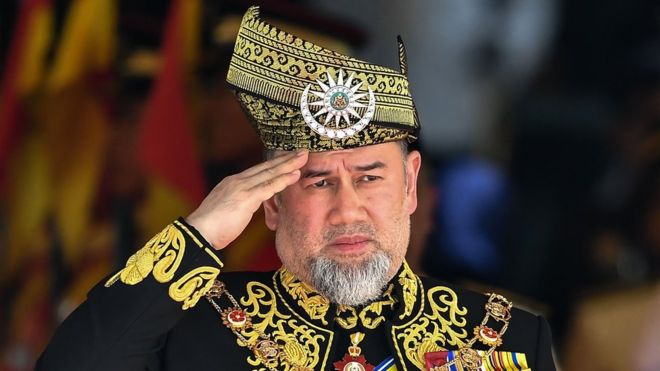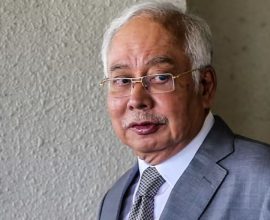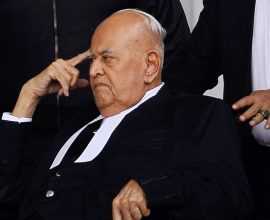Can the King resign?
Yesterday, there was a flurry of social media messages that the King had resigned. Can His Majesty do that? That is the question. What is the answer?
His Majesty Sultan Muhammad V was the 15th King of Malaysia, until yesterday.
He is best known for what he did on the opening of Parliament on 14 July, 2018.
The previous regime had lost its iron grip on the country at the 09 May 2018 elections.
Parliament was convened. The King, as its constitutional head, arrived for its opening.
The MPs of the previous regime staged a walk-out. They protested the appointment of the Speaker, Datuk Mohamad Ariff Md Yusof, a former Court of Appeal judge.
When proceedings commenced the King took his place at the head of parliament. As he sat, he made a brief, wry statement.
Posterity will preserve it for capturing the mood of the day.
“Please be seated. And please do not run away.” [‘Sila duduk, dan jangan lari!’].
He rocked the whole of Parliament into laughter.
This famous King has resigned. Can he do that?
He can.
There are numerous provisions in the Federal Constitution that deal with the position of the King and the Federation. The starting point is under Article 32.
Article 32. Supreme Head of the Federation, and His Consort
(1). There shall be a supreme head of the Federation, to be called the Yang di-Pertuan Agong, who shall take precedence over all persons in the Federation and shall not be liable to any proceedings whatsoever in any court except in the Special Court established under Part XV.
(2). The consort of the Yang di-Pertuan Agong (to be called the Raja Permaisuri Agong) shall take precedence next after the Yang di-Pertuan Agong or all other persons in the Federation.
(3). The Yang di-Pertuan Agong shall be elected by the Conference of Rulers for a term of five years, but may at any time resign his office by writing under his hand address to the Conference of Rulers or be removed from office by the Conference of Rulers, and shall cease to hold office on ceasing to be a Ruler.
(4). The provisions of Parts I and III of the Third Schedule shall apply to the election and removal of the Yang di-Pertuan Agong.’
Resignation
So, under Article 32(3) the King may – and in this case did – resign his office by the simple expedient of a resignation letter. That was sent to the Conference of Rulers. They have no power to reject such a letter.
A local newspaper reports that the King had resigned on 06 January 2019. The announcement was accompanied by a formal letter confirming it.
To understand the power structure that surrounds the King, it is necessary to have some regard to how Kings are appointed in Malaysia.
Conference of Rulers
The Conference of Rulers regulates all things royal. It has its origins in the 1897 Council of Rulers of the Federated Malay States. The current one is a body established by the Constitution. The Conference selects the King.
At any Conference of Rulers, all its members are equals.
Even the King has no precedence above the other Malay Rulers; he merely represents the federal government.
Each ruler takes turns chairing the Conference.
There appears to be a tradition in granting some deference to a senior ruler – one who has ruled for a greater duration; but that is all.
While his voice may be widely respected, it may not be followed.
The Secretary of the Conference is the Keeper of the Rulers’ Seal.
Other ways by which the throne may be lost
Apart from a resignation – which has been exercised in Malaysia for the first time –there are other ways by which a King may lose his throne. The first is the obvious one: after the completion of his tenure, the King’s right to the throne ceases. The other is death.
Rotational system by use of a Royal Election List
Once the throne has fallen vacant, the Constitution dictates how the next King is to be chosen. This is a rotational system. It is not practised anywhere else in the world.
The Constitution dictates that there shall be such a thing as an ‘Election List’.
The Election List contains the names of all the Rulers in ‘an order of precedence’ set by the Rulers themselves.1Section 4, Part I, Third Schedule, Federal Constitution
When there is a vacancy for the post of King, the Conference of Rulers will offer the office to a Ruler – whose turn it is – in the Election List.
If he declines, the Conference will then offer it to the next candidate, until a Ruler accepts the office.2Section 4, Part I, Third Schedule, Federal Constitution
The discretion of the Conference – to elect, or remove, a King
It is the Conference of Rulers which has the power to determine on who shall become King.
It can also remove a reigning monarch.3Article 38(2)(a); and (6)(a)
The Conference of Rulers may remove a king for one of three reasons: a ruler’s of infirmity of mind, body or ‘for any other cause’.4Section 1(1)(c)
This power is unique to Malaysia.
The powers exercised by the Conference of Rulers, and their discretion are quite wide.
Secret Ballot
Where there is a view that a King is to be removed, the Conference of Rulers meet. They then come to a ‘resolution’.
Decisions are by Secret Ballot.5Section 1(2), Part 1, Third Schedule
The Conference cannot carry a resolution – to remove the King – without the votes of at least five members of the Conference.
No similar precedent
The press has been using the word ‘abdication’. While this has, until 06 January 2019, never happened in Malaysia, there are, however, precedents elsewhere.
An impulsive British prince, a Baltimore woman, and Destiny
For more than a quarter of a century, King George V was the ruling monarch of all of the United Kingdom and its dominions.
His eldest son was Prince Edward.
Edward’s younger brother was Prince Albert.
Neither the royal household or the rest of the world ever expected Albert to be a monarch. That job was guaranteed to Edward – and his descendents.
Albert was not part of the equation.
Fate, an impulsive prince and a diminutive woman from Baltimore all had a hand in reversing that expectation.
Together, they altered the course of the British monarchy.
Prince Edward
Edward was as impulsive as he was carefree. He had a penchant for ignoring court protocol. On 10 January 1931, before Edward became king, he attended a party.
Edward’s friend, Lady Furness, hosted it.
There, the prince was introduced to Wallis Simpson.
Simpson was an American. She was divorced once, had re-married; and had moved into London.
She wasn’t particularly rich, ‘politically astute, or good natured’.6https://www.biography.com/people/edward-viii-9542031
In 1934, Simpson caught Edward’s roving eye. Afterwards she conquered his heart.
From then on things went into a downward spiral.
Apparently, the prince obeyed everything she said.
It has been reported that Lady Simpson kicked him under the table during dinner parties, ordered the Royal household about and ‘[wore] the crown jewels’.7Ibid
That an American divorcee with a questionable past had so much control over the heir-apparent led to anxiety among government and establishment figures.8Edward VIII’s official biographer, Philip Ziegler, pp. 231–234
George V dies, and leaves Prince Edward the throne
King George V died on January 20, 1936.
Edward was installed as King Edward VII of the United Kingdom.
Constitutional crisis
Shortly afterwards, King Edward declared his desire to marry Simpson.
She was in the midst of a divorce from her second husband.
The King caused a constitutional uproar.
The prime ministers of the United Kingdom and the Dominions opposed the marriage.
Marrying a divorced woman with two living ex-husbands was politically and socially unacceptable to a prospective queen consort.
Edward was also the titular head of the Church of England.
The Church did not allow a divorced person to remarry if a former spouse was still alive [that changed in In 2002, when the Church allowed divorced persons to remarry in church under certain conditions].
The British Prime Minister, Stanley Baldwin, threatened to resign if the marriage went ahead. That would have forced a general election. Had that happened, the King’s status as a ‘politically neutral,’ constitutional monarch would have been prejudiced.
Abdication
In 1937, when it became plain he could not marry Simpson and still remain on the throne, Edward did the unthinkable.
He abdicated.
He said,
“I found it impossible to carry the heavy burden of responsibility and to discharge my duties as king as I would wish to do, without the help and support of the woman I love.”
After his abdication, he took on the title of Duke of Windsor. In 1937, what he could not do in the UK, he did in France. He married Simpson.
The King’s Speech
King Edward was succeeded by his younger brother, George VI.
Do you remember the 2010 movie, ‘The King’s Speech’?
That was Prince Albert, the younger brother of Edward.
Albert became King George VI.
He died in 1952.
He was succeeded by his first born, Queen Elizabeth.
Her Majesty reigns to this day.
Life after Abdication
Edward and Simpson lived in Paris, and ‘spent most of their time shopping and partying with the international jet set’.9[https://www.biography.com/people/edward-viii-9542031]
Yet, having so precipitously given up his throne, ‘Edward spent the rest of his life mourning for it’.10The Independent, 10th June 2008. See https://www.independent.co.uk/voices/commentators/tanya-gold-why-wallis-simpson-should-get-her-blue-plaque-843566.html
The couple went about referring to themselves by their initials: ‘W.E’.
This was a dig at the royal house: ‘we,’ is only used by the monarch. It is otherwise known as the ‘majestic plural’.11https://www.biography.com/people/groups/edward-viii-and-wallis-simpson
And it did not go down well.
When Prince Edward died in France in 1972, he was buried at Windsor Castle.
An embittered Simpson would join him – 14 years later.
With a reign of 326 days, Edward was one of the shortest-reigning monarchs in British history.
Our former King, Sultan Muhammad V, took up his post as King on 13 December 2016. He resigned on 06 January 2018. That was a passage of 754 days.
Who would deny that he was a witty King?





